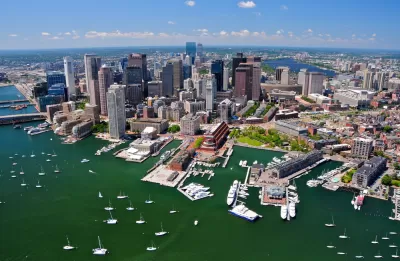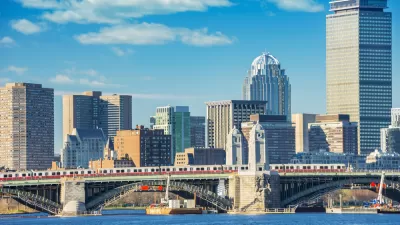Beginning this week, the city of Boston will ask developers how they plan to include women and minorities as workers and investors when putting city-owned real estate out for bid.

To address "persistent criticism" that lower-income, non-white neighborhoods are being denied the benefits of recent construction in Boston, the city is debuting a new process in which developers seeking to build on city-owned sites will be queried on their inclusion commitments.
Tim Logan writes, "When putting city-owned real estate out for bid, city agencies will now specifically ask developers how they will work to include minority workers, professional-service firms, and investors in their project, and how they'd address the risk of residents, and neighbors, being priced out of their buildings."
Last year, City Council members Ayanna Pressley and Michelle Wu "spearheaded an ordinance that calls for similar diversity plans on city contracts and construction projects." Now those guidelines will apply to a variety of real estate sites the city plans to sell.
The new rules only apply to city-owned land, not land owned by state agencies or privately-held sites. But officials like economic development director John Barros hope a broader conversation will emerge. "This is about where the City of Boston is going, and how we do business. We're saying this matters," he said.
FULL STORY: Boston to ask developers about their inclusion of minority and women workers, investors

Study: Maui’s Plan to Convert Vacation Rentals to Long-Term Housing Could Cause Nearly $1 Billion Economic Loss
The plan would reduce visitor accommodation by 25,% resulting in 1,900 jobs lost.

North Texas Transit Leaders Tout Benefits of TOD for Growing Region
At a summit focused on transit-oriented development, policymakers discussed how North Texas’ expanded light rail system can serve as a tool for economic growth.

Why Should We Subsidize Public Transportation?
Many public transit agencies face financial stress due to rising costs, declining fare revenue, and declining subsidies. Transit advocates must provide a strong business case for increasing public transit funding.

How to Make US Trains Faster
Changes to boarding platforms and a switch to electric trains could improve U.S. passenger rail service without the added cost of high-speed rail.

Columbia’s Revitalized ‘Loop’ Is a Hub for Local Entrepreneurs
A focus on small businesses is helping a commercial corridor in Columbia, Missouri thrive.

Invasive Insect Threatens Minnesota’s Ash Forests
The Emerald Ash Borer is a rapidly spreading invasive pest threatening Minnesota’s ash trees, and homeowners are encouraged to plant diverse replacement species, avoid moving ash firewood, and monitor for signs of infestation.
Urban Design for Planners 1: Software Tools
This six-course series explores essential urban design concepts using open source software and equips planners with the tools they need to participate fully in the urban design process.
Planning for Universal Design
Learn the tools for implementing Universal Design in planning regulations.
City of Santa Clarita
Ascent Environmental
Institute for Housing and Urban Development Studies (IHS)
City of Grandview
Harvard GSD Executive Education
Toledo-Lucas County Plan Commissions
Salt Lake City
NYU Wagner Graduate School of Public Service





























